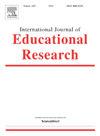Inclusive education from an ethical and connection perspective: The implementation of school integration programs in Chilean rural schools
IF 2.5
3区 教育学
Q1 EDUCATION & EDUCATIONAL RESEARCH
引用次数: 0
Abstract
Educational inclusion policies in Chile have sought to expand equitable access to schooling, with significant implications for rural education. Rural schools increasingly enroll students excluded from urban schools, many with special educational needs and irregular trajectories. While the School Integration Program (PIE by the Spanish acronym) was designed to address such diversity, its implementation in rural contexts presents multiple challenges. This study examines how rural schools mediate the inclusion of urban students through institutional practices. A multiple-case study was conducted in five rural schools across three macro-regions of Chile, using interviews, participant observation, and intra- and cross-case analysis. Findings reveal that, at the policy level, schools must comply with diagnostic-based regulations and quota systems that overlook rural specificities, leading to overcrowding, professional turnover, and infrastructural limitations. Culturally, rural schools construct an ethic of care that emphasizes student relationships, trajectories, and territorial ties, forming a distinctive dimension of institutional mediation. At the practical level, tensions arise between biomedical approaches, which label students, and pedagogical logics that promote inclusion without stigmatization. The study concludes that rural schools implement the PIE through situated institutional mediation, integrating ethical principles, organizational decisions, and pedagogical relationships to navigate the complexities of inclusive education.
伦理与联系视角下的全纳教育:智利农村学校整合计划的实施
智利的教育包容政策力求扩大公平入学机会,这对农村教育具有重大影响。越来越多的农村学校招收被城市学校排除在外的学生,其中许多人有特殊的教育需求,生活轨迹不规则。虽然学校融合方案(PIE,西班牙语首字母缩写)旨在解决这种多样性问题,但在农村环境中实施该方案面临多重挑战。本研究考察了农村学校如何通过制度实践来调解城市学生的融入。本研究在智利三个宏观区域的五所农村学校开展了多案例研究,采用访谈、参与者观察、内部和跨案例分析等方法。调查结果显示,在政策层面,学校必须遵守基于诊断的法规和配额制度,而这些法规和配额制度忽视了农村的特殊性,导致过度拥挤、专业人员流失和基础设施限制。在文化上,农村学校构建了一种强调学生关系、轨迹和地域联系的关怀伦理,形成了一种独特的制度调解维度。在实践层面,给学生贴上标签的生物医学方法与促进包容而不污名化的教学逻辑之间出现了紧张关系。该研究的结论是,农村学校通过适当的制度调解、整合伦理原则、组织决策和教学关系来实施包容性教育,以应对包容性教育的复杂性。
本文章由计算机程序翻译,如有差异,请以英文原文为准。
求助全文
约1分钟内获得全文
求助全文
来源期刊

International Journal of Educational Research
EDUCATION & EDUCATIONAL RESEARCH-
CiteScore
6.20
自引率
3.10%
发文量
141
审稿时长
21 days
期刊介绍:
The International Journal of Educational Research publishes regular papers and special issues on specific topics of interest to international audiences of educational researchers. Examples of recent Special Issues published in the journal illustrate the breadth of topics that have be included in the journal: Students Perspectives on Learning Environments, Social, Motivational and Emotional Aspects of Learning Disabilities, Epistemological Beliefs and Domain, Analyzing Mathematics Classroom Cultures and Practices, and Music Education: A site for collaborative creativity.
 求助内容:
求助内容: 应助结果提醒方式:
应助结果提醒方式:


